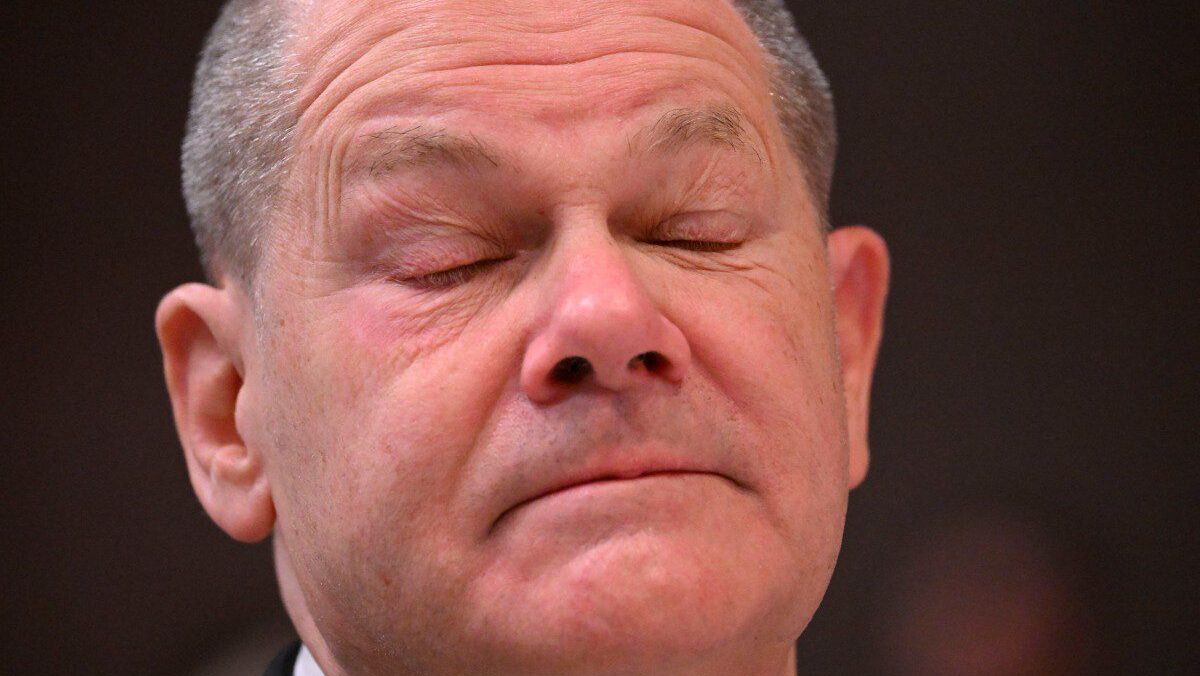
German Chancellor Olaf Scholz attends the congress of his social democratic SPD party in Berlin on December 9, 2023.
Photo: by Tobias SCHWARZ / AFP
Germany’s ‘traffic light’ coalition, or ‘car-crash coalition’ as some have recently called it, appears to be in the process of imploding, with recent party congresses revealing deep internal divisions—not only between coalition members but within the parties themselves—on the issue of migration.
A policy resolution on migration, adopted by the SPD at its federal congress, that will loosen Germany’s laws on migrant family reunification—and as a result further facilitate chain migration—has prompted sharp criticism from the liberal FDP, its junior coalition partner, and marks a clear departure from the tougher course of migration that Chancellor Scholz had previously spoken in favor of.
The SPD’s policy resolution on migration comes as Germany is struggling to cope with a massive influx of asylum applicants. Last month, the number of asylum claims for the year surpassed 300,000, a 60% jump from the previous year and the highest number recorded since the 2016 migrant crisis, according to figures from the Federal Office for Migration and Refugees (BAMF)
In his criticism of the SPD’s move, Stephan Thomae, the Parliamentary Managing Director of the FDP parliamentary group, pointed out this fact, arguing that now is not the time to be implementing policies that will promote and facilitate more migration. Thomae declared,
In view of the high number of asylum seekers and the overburdened municipalities, the SPD proposal on migration policy is unrealistic and sends the completely wrong signal. We must relieve the burden on our asylum system and promote a new realpolitik in migration. There will therefore be no easier family reunification with us.
Thomae’s disapproval of the traffic light coalition’s migration policies echoes criticism previously leveled by the FDP deputy leader Wolfgang Kubicki, who described the government’s migration policy as “an absolute piece from the madhouse.”
The SPD’s adoption of the policy resolution comes at a time when the party is facing an internal dispute over how to deal with surging migration—and, by extension, inhibit the rise of the anti-mass-immigration Alternative für Deutschland (AfD). Thuringia’s Interior Minister Georg Maier previously urged the chancellor to limit the number of asylum seekers coming to Germany by designating more third countries as “safe countries.”
The divide has shown itself to be present at the highest levels of the party. Chancellor Scholz last month agreed with the heads of Germany’s sixteen states to adopt stricter immigration measures, including lowering hurdles that prevent the deportation of illegal migrations, while his interior minister Nancy Faeser (SPD), at the same time, ordered BAMF to relax security checks of asylum seekers to “speed up asylum procedures.”
“We have to reduce the number of people who come to us,” Maier said, adding: “We should increase the number of safe countries of origin. For me, the Maghreb states are one of them.” Deputy leader of the SPD parliamentary group Dirk Wiese also spoke of the need for more countries to be deemed safe so that asylum seekers who are unlikely to receive positive decisions will not come to Germany in the first place.
Right-liberal opposition CDU politician Alexander Throm criticized the SPD’s resolution even more sharply, arguing that it is indicative of the party having lost its grip on reality. “The SPD is suffering from a rapid loss of reality. Anyone who calls for an expansion of family reunification in one of the biggest migration crises has lost all ability to govern,” Throm asserted.
“The SPD wants even more asylum seekers to come to our country. This is the opposite of an asylum transition,” Throm told German media, adding that the government should instead be looking to employ all tools “to limit and reduce incentives to flee to Germany.”
“There finally needs to be a real limit on all the adjustments where this is possible, such as suspending family reunification with those entitled to subsidiary protection,” he concluded.
Meanwhile, the Green party’s suspension of its congress in Berlin after its members rejected its sole candidate for the vacant position of state chairmanship in the dual leadership is indicative of deep internal divisions.
Tanja Prinz, a member of the Green’s Realo wing, who has pushed for rapprochement with the CDU, was rejected by delegates to become the party’s co-chair alongside Philmon Ghirmai—a member of the party’s Left wing—for a third time. 41 voted in favor of her while 104 voted against. The party’s failure to elect a candidate from its centrist faction reveals a split between its members as to how the party ought to orient itself directionally moving forward.
